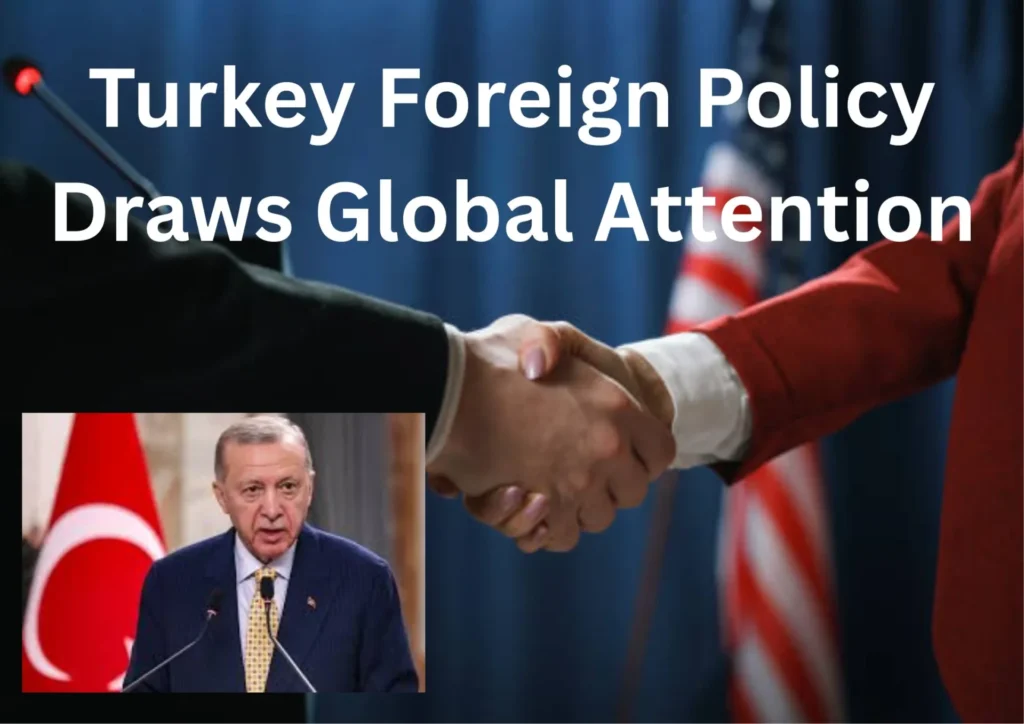Turkey’s foreign policy has taken a bold turn in recent years, especially under President Recep Tayyip Erdoğan. Its growing assertiveness across regions, ranging from the Middle East to NATO and Eurasia, regularly draws global attention and reactions. Whether it’s military interventions, disputes with neighbors, or balancing relations with both the West and Russia, Turkey’s choices often reverberate far beyond its borders.
The Strategic Importance of Turkey’s Location
Turkey’s geographic position makes it one of the most strategically important countries in the world. It sits at the intersection of Europe, Asia, and the Middle East, connecting continents, cultures, and conflicts.
- Bosporus and Dardanelles Control: Turkey oversees the Turkish Straits, which handle over 41,000 commercial vessels annually, including energy shipments from Russia and Central Asia to Europe.
- NATO’s second-largest military: With over 355,200 active personnel (2024 est.), Turkey holds the second-largest standing military force in NATO after the U.S., making it a critical player in regional security.
Why Geography Amplifies Influence?
- Middle East Proximity: Turkey borders 8 countries, including Syria, Iraq, and Iran, making it central to Middle Eastern diplomacy and security.
- EU–Russia buffer: As a NATO member located near Russia, Turkey is vital to Western efforts to contain Russian influence in Eastern Europe and the Caucasus.
Erdoğan’s Assertive Foreign Policy Approach
Erdoğan’s foreign policy is defined by independence from traditional Western alliances and proactive regional engagement. He often frames this shift as necessary for defending Turkish sovereignty and influence.
- Foreign policy doctrine: Dubbed a “Neo-Ottoman” by some analysts, this approach seeks to restore Turkey’s historical regional stature.
- Presidency power consolidation: Since switching to a presidential system in 2018, Erdoğan has centralized foreign policy decision-making.
Shifting Away From Traditional Allies
- US Relations: Relations with the U.S. soured after Turkey purchased the Russian S-400 missile system in 2019, leading to sanctions under CAATSA and removal from the F-35 fighter jet program.
- Russia Relations: Despite opposing sides in Syria, Turkey and Russia cooperate in energy (e.g., TurkStream pipeline, which delivers 31.5 billion cubic meters of gas annually) and defense sectors.
Turkey’s Role in Regional Conflicts
Turkey’s military has expanded its influence through operations across multiple theaters, using a combination of direct intervention, drone warfare, and diplomatic leverage.
- Syria: Turkey has launched 4 major cross-border operations since 2016, citing threats from Kurdish YPG forces (linked to the PKK, a designated terrorist group by Turkey and the U.S.).
- Libya: Turkey supports the UN-backed Government of National Unity. Its intervention, including Bayraktar TB2 drones, helped reverse gains made by rival factions backed by Egypt and Russia.
- Nagorno-Karabakh: In the 2020 Armenia-Azerbaijan war, Turkish drones were instrumental in Azerbaijan’s victory, reinforcing Turkey’s military export clout.
Strategic Military Interventions
- Defense Exports: Turkey exported over $5.5 billion in defense equipment in 2023, with Bayraktar drones being its most famous product, used in Ukraine, Azerbaijan, Ethiopia, and Libya.
- Global Drone Leader: Turkey ranks among the top 5 countries globally in combat drone production.
Tensions with Neighboring Countries
Turkey’s confrontational posture has led to disputes with several neighboring states, particularly over maritime rights and resource claims.
- Greece & Cyprus: Turkey disputes exclusive economic zones (EEZs) in the Eastern Mediterranean. In 2020, tensions escalated after Turkey deployed the Oruc Reis research vessel into contested waters.
- Energy Reserves: The Eastern Mediterranean is believed to hold 122 trillion cubic feet of natural gas. Turkey’s exploration efforts have triggered condemnation from the EU and NATO allies.
Turkey’s Complicated Role in NATO
Despite being a founding NATO member, Turkey has repeatedly taken actions that contradict alliance priorities.
- S-400 Purchase from Russia: The $2.5 billion deal signed in 2017 angered NATO, as the system is incompatible with NATO defense networks.
- Blocking NATO Expansion: In 2022, Turkey delayed Sweden and Finland’s NATO membership bids, demanding action against Kurdish militants sheltered in those countries.
- NATO Contribution: Turkey contributes troops to NATO operations in Kosovo, Afghanistan (until 2021), and the Baltic Sea region.
Global Reactions to Turkey’s Foreign Policy Moves
Turkey’s foreign interventions and policy shifts often invite global reactions that range from sanctions to cooperation.
Western Criticism and Sanctions
- EU Sanctions: Imposed sanctions in response to Turkish drilling activities in Cypriot waters.
- U.S. CAATSA sanctions: Imposed in December 2020, targeting Turkey’s defense procurement agency over the S-400 deal.
- Human Rights Concerns: Turkey ranks 165 out of 180 in the 2024 Reporters Without Borders Press Freedom Index, raising concerns in Western capitals.
Muslim World’s Mixed Response
- Turkey is popular in parts of the Muslim world for its vocal support of Palestinians, criticism of India’s Kashmir policy, and hosting 3.6 million Syrian refugees, the highest number in the world.
- However, Gulf States like Saudi Arabia and UAE remain wary of Erdoğan’s ambitions and ideological leanings, particularly those linked to the Muslim Brotherhood.
Russia and China’s Pragmatic Cooperation
- Trade with Russia topped $57 billion in 2023, making Russia one of Turkey’s largest trading partners.
- China and Turkey are linked through the Belt and Road Initiative, with Turkey acting as a bridge to Europe. Bilateral trade between Turkey and China reached $44 billion in 2023.
Domestic Politics Shaping Foreign Ambitions
Erdoğan’s foreign policy is deeply intertwined with domestic politics. In times of economic hardship or political tension, foreign policy successes are framed as national victories.
- Approval Ratings: Turkish military operations often lead to short-term boosts in Erdoğan’s approval. For instance, Operation Peace Spring in Syria (2019) was supported by 79% of Turkish citizens.
- Nationalism on the rise: Parties across the spectrum, including opposition groups, often support assertive foreign policy moves, reflecting widespread nationalist sentiment.
Conclusion
Turkey’s foreign policy has become more assertive, ambitious, and controversial than ever before. Its location, military power, and shifting alliances have positioned it as a pivotal, but polarizing, actor in global politics. Whether Erdoğan’s 2025 foreign policy strategy leads to greater influence or further isolation depends on how Turkey balances its domestic ambitions with international expectations.
As of now, the world is watching and reacting to every move Ankara makes.











